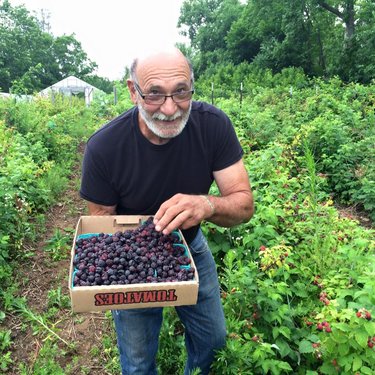Lansing Farm conserved: Keeping local food accessible and space in suburbia open
ALBANY COUNTY — The 20-acre Lansing Farm on Lisha Kill Road — all that remains of the original 1,000-acre farm — in suburban Colonie has been conserved.
Working with Mohawk Hudson Land Conservancy and conservation partners Equity Trust, Inc. and Scenic Hudson, the Lansing Farm has now been permanently protected as farmland by a conservation easement, the conservancy announced this month.
“My family has been farming these soils since 1788 — it is more than just a way to make a living; it is our way of life. Now, these soils can continue to produce food for many more generations,” said Al Lansing in a statement.
He initially reached out for help to Equity Trust, a Massachusetts not-for-profit that has pioneered strategies for preserving working farms. In 2018, MHLC partnered with Equity Trust to apply for a Farmland Protection Implementation Grant from the New York State Department of Agriculture and Markets.
With this, the campaign to protect this community asset began. Equity Trust provided almost two thirds of the 25-percent match required for the state grant and the Friends of Lansing Farm, a group of interested neighbors and supporters of the farm, helped spread awareness and raise funds to support the campaign.
Seeing Lansing Farm’s value as a local food resource and contributor to the larger Hudson Valley Foodshed from just north of the farm south to New York City, Scenic Hudson closed the remaining fundraising gap last fall.
In addition to protecting the land from development, the conservation easement includes a “preemptive purchase right,” a provision that will enable MHLC to ensure that the land will always remain productive farmland and only be sold to working farmers at its agricultural value.
Lansing Farm hosts more than 100 community-supported agriculture members each year, contributes to regional food pantries through the Capital Roots Squash Hunger campaign, and serves as a gathering place to connect people to the land.
The conservancy has had farmland preservation as a priority for a long time, Director Mark King told The Enterprise earlier, beginning in 2003 when it helped with purchase of development rights for Indian Ladder Farms in New Scotland.
“That has been a great success,” said King.
The century-old Indian Ladder has been in the Ten Eyck family for generations. What was once a dairy became an apple orchard and is now a tourist destination with a restaurant as well as a cidery and brewery.
The farm, King noted, is also part of a protected corridor, which involves most of the land between Indian Ladder Farms and Thacher State Park, including the Black Creek Marsh and the Tygert Road Marsh.
While protecting corridors is important, King said, protecting the Lansing farm achieves a different goal. “People need to have access to open spaces wherever they are,” he said.
King went on, “The farm is in a really heavily developed neighborhood; it’s one of the few open spots left.”
The Lansings’ 20 acres on Lisha Kill Road contains 95 percent prime soils and 1 percent statewide important soils, according to the governor’s office.
“Colonie had a lot of really quality farmland,” said King, with rich soils and good drainage. “Now it’s down to the last bits.”
This project will enable the Lansing family to transfer ownership to the next generation and it will also ensure long-term affordability to future farmers by incorporating a pre-emptive purchase right.
This is the first time the awarded funds have allowed for the use of preemptive purchase rights, which encourage agricultural land to remain in active production and require that it be sold to other farmers at its agricultural value.
The ninth generation of the Lansing family farming the land is committed to preserving it for farming in perpetuity, King said. All four of Al Lansing’s children — Patrick, Jessica, Sabrina, and Albert — currently work on the farm.
Their farm employs six people, for greenhouse, retail, and field work.
“It’s a very productive farm,” said King, noting that the Lansings grow 20 kinds of vegetables, seven kinds of fruits, a wide variety of herbs and flowers, and also have a big blueberry patch. The farm brings in an annual $110,000 in sales.
The Lansings provide other farms with seedlings and farmers’ markets with produce. They also sell products, like cheese, maple syrup, and olive oil, from other local farmers.
“A farm like this keeps local food accessible to people,” King concluded. “So people understand food does come from the land.”



